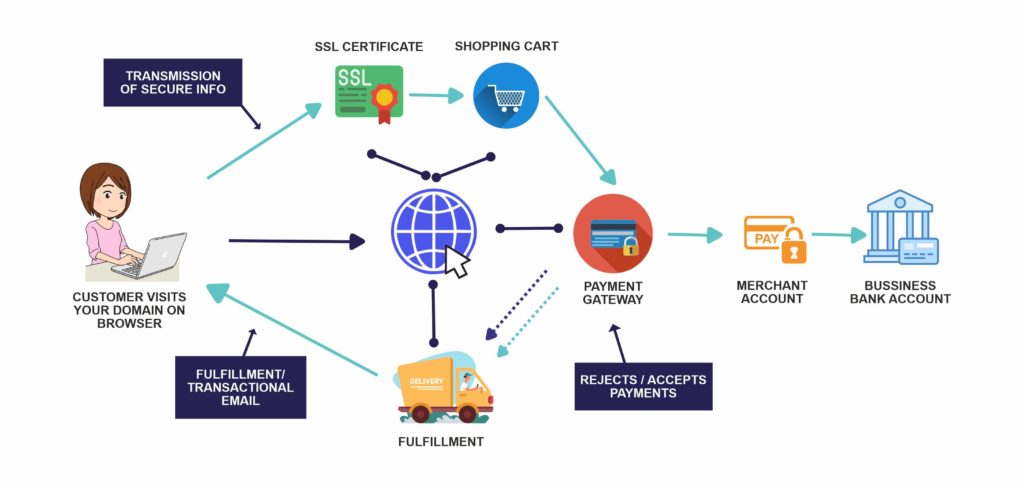What is Electronic Commerce (E-Commerce)?

As shown in the above image, E-commerce is a business model where commercial transactions are conducted electronically over the Internet. It is also referred to as electronic commerce, internet commerce, or online commerce. Ecommerce businesses or stores are those that conduct business online.
For instance, one of the most well-known online retailers in the e-commerce sector is Amazon.com.
The terms e-business and e-commerce should not be mixed up. The terms are not equivalent, despite occasionally being used in the same sentence. E-business refers to all facets of running an online business, whereas ecommerce specifically denotes the exchange of goods and services.
What is an E-Commerce Website?
E-commerce websites are online marketplaces that enable online exchanges of goods and services by transferring data and money over a network. E-commerce was initially conducted in part over the phone and through emails.
Currently, a transaction can be completed online using a single website for everything that it requires.
What are the types of e-commerce websites?
eCommerce Website Types and Typical Business Models B2C retailers make up the majority of eCommerce websites online.
There are numerous varieties of eCommerce websites, though:
- B2B (business to business)
- B2C (business to consumer)
- C2C (consumer to consumer)
- C2B (consumer to business)
- B2A (business to public administration)
- C2A (consumer to public administration)
How Do Ecommerce Websites Work?

- Ecommerce Website Platform: the platform or program used to create your website. Examples include Wix, BigCommerce, and Shopify.
- Shopping Cart: the area of your website that makes it easier for customers to check out and buy things.
- SSL Certificate: the technology that maintains the security of your website for financial transactions.
- Payment Gateway: the technology that receives payment information from customers and approves or rejects payments depending on whether funds are available.
- Payment Processor: a third party between the customer and you, the merchant, who manages credit card transactions.
- Business Bank Account: Following the completion and processing of transactions through the merchant account, funds are transferred to the checking account.
- Fulfillment: the method used to store and deliver packages to customers.
What are the benefits of E-Commerce Websites?
- Not working from 9 to 5: The best thing about the internet is that it’s accessible day or night, as long as you have access to a wifi connection! Therefore, your target customer might end up on your website if they wake up in the middle of the night and are unable to go back to sleep.
- Simple as a Sunday morning: Putting something online is now simpler than ever before! The straightforward procedure is to upload a photo of the item, write a description, and then wait for the customers to arrive.
Of course, there is more work that is done behind the scenes, particularly with SEO to help promote your website, but it’s simple with assistance from a fantastic team like ours. - Everywhere in the World: The fact that the internet is truly global is just one of its many wonderful features! You have access to a wide range of websites to help satisfy your online needs, whether you’re in South Africa, Australia, or the U.K.
- Knowledge is power: Finding out more about your customers is now even simpler if you have an online presence. You can learn a lot about your website’s visitors by using free online tools like Google Analytics, including how frequently they visit it, what pages they click on, how they found it, and more. It’s totally free, as I already mentioned. And it’s among the best ways to learn more about your clients.
- Man vs. Machine: Computers can store enormous amounts of information that is instantly accessible to almost everyone, but humans are notorious for forgetting details.
Therefore, having a website will enable you to provide your customers with all the information they need to learn more about your business.
What better way to give customers all the information they require today, when most consumers prefer to conduct their own research? Not only will this help them make better decisions, it will also give you some extra time.
What are the disadvantages of E-Commerce Websites?
Despite the advantages, ecommerce websites also have some disadvantages. The disadvantages include:
- Higher competition: even though there is a low barrier to entry due to low costs, this also means that new competitors can easily enter the market. To ensure they maintain a digital presence, e-commerce businesses need to use careful marketing strategies and be persistent with search engine optimization.
- Inability to touch products: ecommerce purchases may not be satisfying if the goods received do not live up to customer expectations because online images do not always tell the whole story about an item. A clothing item might be made of inferior fabric than what is shown in the online image.
- Limited customer service: You can’t just ask a salesperson to show you a particular model’s features in person if you buy a computer online. Furthermore, although some websites let you chat with staff members online, this is not a common occurrence.
- Lack of instant gratification: You must wait for the delivery of an online purchase to your home or place of business. E-tailers like Amazon, however, lessen the agony of waiting by providing same-day delivery as a premium option for a few products.
- Reliance on technology: If your website crashes, garners an overwhelming amount of traffic, or must be temporarily taken down for any reason, your business is effectively closed until the ecommerce storefront is back.
Thanks to e-commerce and the Internet, the world has become much smaller. It is quick, simple, and convenient.
As time passes, more people will start using online shopping. So make your business go online, choose a good e-commerce WordPress theme and set up a clutter-free and easy-to-use E-Commerce website with Cosmic, and see your sales and profits rise.

